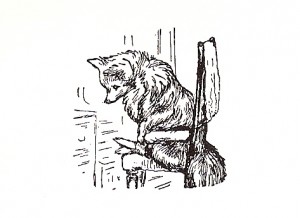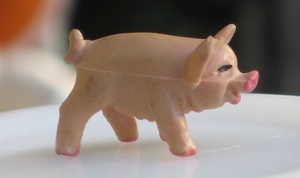Author Archives: Bluth
The Relevance of Webcomics in a Post-Bailout World. Problems With Credit Cards.
Giving The Hairy Eyeball to Banking and Investment!
Bonuses on Wall Street aren’t addressed specifically on webcomic Wigu.com, but the storyline of the site does follow a fantasy of mine about staging a revolution against the present order. There’s a little yellow guy in a red cape named Topato, who sails into the castle and tells the princess, “We’re overthrowing your father’s offensively incorrect idea of a democratic government, my lady. The rule of Law must be allowed to change with the times.”
Right out of my own fantasy mouth! And Topato’s friend, co-leader of the revolution Sheriff Pony, says: “Princess Dongle, by removing your father from power we will be on the path to an equal society. No longer shall a minuscule elite class prey mercilessly upon a lackadaisical, overmedicated working class.”
Then Topato says: “It’s revolution o’clock…”
I consider them both holy men.
I admit I overly enjoy several internet comics. Like Goats.com. According to Goats, when you do something impossible, like invert so you’re sucked into your own personal black hole, thus entering a different universe consisting only of yourself, what is left in this universe is: a Pop Tart. Either that or a kitten, since apparently they’re equivalent.
But in this world, as we’ve seen, the U.S. government intervenes when it feels like it. Otherwise, AIG would now exist as a Pop Tart. (Or kitten.)
And the lots of many car dealerships would be rustling and meowing with — kittens!
When we turn on TV, we’d get back-to-back-to-back commercials for toaster pastries during Bones and 30 Rock instead of ads for Jeeps, Fords, and other pieces of doomed metal.
When Barney Frank opens his mouth to tell us how he’s protecting us in the overseeing of the bailout money, out will fall — a kitten!
Tim Geithner, when he gets hungry during meetings, will have no worries, because his pockets will miraculously be full of Toaster Strudels. (Which will make him very sticky. If he seems reluctant to shake hands, you’ll understand why.)
Eric Cantor will open his box of Lipton teabags to hand some out to his friends but will find only crushed crumbs of strawberry-frosted toaster pastries, mixed with kitten hairs.
Persons attending grass-roots protests of tax policy will discover neither grass nor root, only Pop-Tart policy with kitten tax.
(Images above from Wigu.com and used by permission of artist.)
*********
And now, shall we speak of Usury?
We are not speaking of simple moneylending, which Shylock engaged in. I never saw any proof that Shylock charged an unreasonable interest. He just had to find some sort of career out of the usual since he was a Jew and not allowed to own land.
We are referring to interest that is above and beyond what humans should be paying, charging usurious rates of interest on money lent. The notion of creating wealth for yourself from thin air this way disgusted our forefathers. They had respect for manual work, for craftsmanship, for farming, etc. They did not care, on the other hand, for people who found ways of getting the fruit of others’ labor through capitalizing.
Dante put Usurers in the same circle of Hell as sodomites and others who engaged in “unnatural practices.” Labor was “natural,” lending was not. The Roman Catholic Church considered it unearned income. So society was fairly prejudiced against lending to begin with; but as soon as economies began becoming more sophisticated (which happened in the Stone Age) it became a necesssary part of the whole. What was considered too high an interest to charge, then?
In past centuries, 10 percent often used to be a sort of cutoff. I don’t think it’s related to titheing. It’s just a number. For instance, British government in 1545 used to penalize lenders trying to charge more than that.
And today, ten percent seems to echo in many quarters, still, as an upper limit on consumer personal loans, but if you check laws for your state, they actually go all over the board. Some states don’t seem to even have a cap. And exceptions apply all over. Speaking of lending laws, why don’t credit cards fall under these laws completely? If the federal law states that a company may charge fees that are “legal” in the particular state the customer is in, how does it happen that I have the rates I do? Why are late payment penalties considered the same as interest and in what calculator does the penalty for a late $1 charge become $29 and still remain a legal percentage of the original charge? So a rate of 2900% is legal in my state? In any state??
Pardon. I seem to be foaming at the mouth.
Ah, Capital One. Ah, BOA, ah Wells Fargo. If only we were free to change the terms of our contract with you at any time, as you are. We would cut our rates by 5 percentage points; forgive ourselves for, say, 2 late payments per year; eliminate monthly or yearly membership fees and replace them with a single joining fee. That seems fair. And for your past practices, we grant ourselves the right to walk up to you in the street and slap you in the face once without legal repercussions, or key your cars once, or merely harmlessly spit on you each and every time we see you.
Now, that’s what I call a contract. And it’s social!
I wouldn’t feel so strongly if we were also able to earn similar interest in your banks when you use our money, you see. Why is it okay for banks and other lenders to charge these incredible percentages but no ordinary customer can get anything like that in any sort of savings instrument? Savings accounts, money market accounts yields have fallen to one-half, one, or perhaps two percent in most cases.
I am waiting to hear what happens with the bill Chris Dodd has gotten past committee in the Senate, which at least halts the hikes in rates on credit cards “at any time, for any reason” but feel sure that the CC companies will do what they can to FIND reasons.
Tomorrow among other things I might ponder the phone companies. The execs of those certainly get a lot of pay bonuses. And I will be annoying.
Don’t blame me; I get my orders from Sheriff Pony.
He’s blue.
Wall Street’s Duplicitous Financial Products. My Sickness, and The Problem of Visiting The Underworld.
Wall Street Bonuses! Did you get yours yet? No? You must not work on Wall Street, then! You don’t matter in this world!
Down to business.
I have to confess that I descended into the bowels of the earth yesterday, and visited the BileMaster. And I drank some of the brew he makes. It’s awful; tastes like quinine mixed with Gatorade. But you find you can’t stop drinking it, so I had a lot. **

Afterwards, your vision is tinged sort of greeny-yellow with red streaks running down it. Or maybe those red streaks are just the blood running into my eyes from the gash on my head. I don’t know how I got that. I don’t really remember what I did most of the evening.
Today, I find I hate everything. Filth surrounds us. And everyone is a crook, I think. I look around and I see crooks on every side. Crooks, crooks, crooks….
I’m really sorry; I don’t usually talk like this. It’ll take another day or so to get back to normal, so I’ll just get this off my chest and out of my system while I’m waiting to recover my usual sweet self and sunny outlook. So read this, you bastard!
Again — I’m sorry. Hard to control myself.
…..
The President says it was “instant gratification” that fueled the bust of the economy? Not precisely. Instant gratification is to blame for the proliferation of the microwave, Tivo, millions of TV channels, and lots of other stuff like that. The growth of the economy is not equal to the bust of the economy. And that’s what the “culture” of instant gratification helped along: the growth. Not the bust.
It was people doing things that they found they could get away with, because the general public didn’t know about it. It was hidden, greedy crime. That’s what started the bust. Then it was the mismanagement of all the financial institutions dealing with the outcome of that hidden greediness.
No one in the past seemed to consider the big lack of savings accounts on the part of the middle class “the economy” — so let’s not call it that now. Our savings never really figured into things, at least in the last half-century. Only our spending did.
“The economy” still doesn’t care about us. But it will when we’re older, or broke, and out on the street. Then we finally become part of “the economy” because we’re so very visible. Big, out on the streets, demanding answers. Just like Godzilla.
The Duplicitous Products
Back in the early 90s, I thought that America’s main product that the world needed, or at least wanted, was military force and weapons. (Both our army itself, and our weapons manufacturing.) It seemed that the world’s use of us was to make us the police officer of the globe. Or so it seemed to me for about five minutes.
Now, the U.S. supplies the world with things it didn’t really ask for. Except maybe the bankers and finance guys. They would have wanted these things.
What are our products? The credit default swap. Wall Street bonuses as a pay system. The bundled, insured, diced-up bunch of toxic loans. The practice of demanding from customers multitudes of hidden fees that no one thought of charging for, until lately. Duplicitous products of finance and business!
Did you know that fully HALF of the people who received loans from companies like Countrywide, who ended up with Adjustable Rate Mortgages and subprime loans, actually qualified for prime rate loans? That’s fifty percent. That is NOT the poor being enabled to buy houses. That’s regular borrowers duped into signing stuff they didn’t know they were signing. They were conned into putting their names down for ballooning mortgage payments.
This is as good, or better, than the scams of the eighties, when banks were scammed by fake borrowers who took out big loans to flip real estate and other stuff, and eventually just walked off with the money. Of course the fake borrowers were usually also people from banking, who knew how to work the banking system.
This is as good as Enron. As good as manipulating the energy market of the largest state in the nation. As great as Wall Street bonuses. As good as the Bush election in 2000.
…
If you don’t own a bunch of stock, WHY on earth do you worry how the stock market does? (And why are the news media trying to make it so important?) That’s like taking the temperature of your neighbor down the block to see if YOU have a fever or not.
WHY is the credit default swap still a legal transaction? Or is Wall Street simply a bookie operation? Is AIG one?
WHY hasn’t shorting stock been severely restricted already?
I suspect everything and everyone in business now. That’s what the stream of revelations of the machinations of the financial corporations has done to me. For instance, I turn on the TV, there’s this American Idol show running over its time into the next hour. I wonder why — because that never happens. TV ad time is so expensive.
It was planned, I think. A little gimmick that made some sneaky people money in a new way. In the ten minutes of that show overlap, sensation/surprise Adam Lambert sang so prettily. He was:
1) Seen by a whole lot of people who never ordinarily watch American Idol. These accidental viewers were waiting for the show Fringe, which has a very different audience.
2) Missed by the regular viewers of Idol who DVR’d the episode, who probably set their recording devices to correspond with the normal time of the show. They missed the overrun of 10 minutes.
3) Yanked off Youtube.com, which in the first few hours afterwards, showed that video of the last 10 minutes. Now it does not, and people are rabidly searching for it. (He was that interesting, yes.)
4) Sold hugely on iTunes. That 10-minute performance from TV (trimmed down) is now for sale there. The planners managed to keep it exclusive by making it run past its time.
Just an interesting little experiment that was probably very successful.
But the bigger arena of business artistry is elsewhere: the fees that credit card companies, banks, cell phone companies, and other companies have found they could charge us. More examples of American creativity!
It’s hard to list all those newfangled fees that have cropped up in the last year or two. We’ll post a short list of some examples soon. And you’ll soon be noticing those and zillions more, every time you open your eyes. Or your mail.
**The BileMaster evidently sold a batch of his brew to Kenya once. http://news.bbc.co.uk/2/hi/africa/1025120.stm And Alan Turing (father of the Turing Machine) may have eaten an apple dipped in it. It’s bad stuff.
Goldman Sachs, Wall Street Bonus Giver, Sues Blogger
 Mike Morgan, Wall Street blogger and reportedly a registered investment advisor (whatever that means, exactly), is being sued by Goldman Sachs for running his blog site, www.Goldmansachs666.com. Goldman Sachs may simply want the domain name, but are filing a cease-and-desist order against him. Morgan’s blog is extremely critical and sometimes accusative of Goldman Sachs. While his website isn’t that great, needlessly repeating a lot of text, and posting headlines that don’t quite follow through, it does contain a whole lot of information that just adds to our dislike of GS.
Mike Morgan, Wall Street blogger and reportedly a registered investment advisor (whatever that means, exactly), is being sued by Goldman Sachs for running his blog site, www.Goldmansachs666.com. Goldman Sachs may simply want the domain name, but are filing a cease-and-desist order against him. Morgan’s blog is extremely critical and sometimes accusative of Goldman Sachs. While his website isn’t that great, needlessly repeating a lot of text, and posting headlines that don’t quite follow through, it does contain a whole lot of information that just adds to our dislike of GS.
He quotes a recent article, from an economic site, which seems to assert that Goldman Sachs executives lied to Congress about the amount of bonuses it paid. Interesting that GS isn’t suing the author of that article, as far as we know.
(Today’s news focuses on Wall Street bonuses from Bank of America.)
One of the most important articles Morgan links to from his site is from Forbes.com. The full article: http://www.forbes.com/forbes/2009/0413/096-sachs-semgroup-goldman-goose-oil.html — which describes Goldman Sachs’ involvement in oil futures and its relationship with Semgroup Holdings, an oil company which sold oil and invested in oil futures, and went bankrupt in the middle of 2008.
Remember the oil price surge which all of a sudden reversed as if it were a bad dream? (So long ago, it seems.) It drove us all crazy; all sorts of people claimed that speculators were to blame, manipulating the stock market, and then others claimed that speculators couldn’t be doing it. Well, it certainly seems like manipulation was there, for sure. And if some of it was done by GS… we’d like to know, since they practically run the US Treasury.
It seems, from the Forbes article, that J Aron & Co., which is Goldman Sachs’ commodities trading arm, did lots of trades with Semgroup — who had bet that the price of oil would go down. But of course the price kept climbing, somehow. (No one really has a good explanation for that, do they?) Semgroup faced suddenly a margin call for amounts it couldn’t pay, and tried to get J Aron to pay them for oil that Aron had purchased from them. J Aron refused, and wanted its margin call right away. So Semgroup had to file for bankruptcy. And right afterwards… the price of oil broke and began its remarkable plunge.
It’s looking like a duck, and sounding like a duck, and walking like a duck, and…
In The Offices Of The Wall Street Rats
CEO Fat Rat, who had been reading his copy of The Daily Rat quietly in his comfy ultra-chair, threw his newspaper on the floor in disgust. (Fat Rat, who was old-fashioned, still liked to read the newspaper, although all day long he received the latest news by hologram projection in the middle of the board room.) He flung out his little paws. “No one knows how to riot properly anymore,” he snarled.
Tommyrat looked up from some papers he was signing with his beautiful handwriting. “But a riot is… trouble, Boss. We don’t want any trouble from the lower classes. Sir,” he added.
“Hah!”

Mister Fat Rat.
Everyone in the elegant library of the mansion looked at Fat Rat now, who sat baring his teeth at nothing and digging his nails into the arms of his chair (ultrachair). Fat Rat, grand CEO of Always Investing Gonads Corp., seldom discussed business openly with his underlings except when he was issuing orders. A watchful silence fell, and all the rats regarded one another in sidelong glances.
Fat Rat leaned forward. “In the old days, there was a starch to them. The poor people, I mean. They were starchy, all of them. And when we put the pressure on, they’d yell and bite and put up a ruckus. It was interesting.”
Tommy blinked. “I don’t think they have the teeth anymore, sir. In fact” — he shuffled some pages — “their dental plans are practically nonexistent.” He smiled.
“Where are the pitchforks and torches?” Fat Rat yelled. “Where is the outrage, the ugly crowds? We just leaked to the press that we’re giving bonuses to our top staff totaling $165 million, and all the reaction we get is a busload or two of some very polite people asking politely if our guys would consider giving the bonuses back. Then some of them blessed us. Blessed us! Christ, if they get out of hand we’ll just call Nanny911.”
Tommy took off his small eyeglasses and pushed his chair back. “Sir,” he said. “In the present political climate, there is a negative outcome to activity on the part of the workers. Congress sees the populace as volatile, electionarily speaking. So when the workers hold up signs saying ‘Bonuses Unfair,’ Congress says they think so too.”
“I bought 20,000 shares of Pitchforks International last week. I was sure mob rule was about to happen, and they’d charge up the street holding the usual torches and pitchforks, and try to pull us from our beds. The very air smelled like — mob. ”
“Sir,” Tommyrat said, “it’s bad enough. They’re investigating us. They’re inventing new taxes for us.” He peered over his spectacles at his superior. “And of course there have been the threats.”
“No, our propaganda department spread that death-threat rumor. Don’t worry about that,” Fat Rat replied. He was gazing out the floor-to-ceiling window. He sighed. “We had to. The workers didn’t think of it.”
“You… actually bought pitchfork stock, sir?”
Fat Rat nodded. “I was hedging,” he snapped.
“Sir, in order to hedge in this instance, you would –”
“I know, I know. It was something else, I suppose. It was satisfying.”
Tommy punched numbers. “Ah. You are not in difficulties, however, sir. The price of pitchfork shares has not moved. No one in fact remembers what they are.” He squinted at the touchscreen of his ultraphone. “Evidently they are farm implements, sir? Each one costs approximately $34.95.”
From the chair nearby, an ancient, quavering rat spoke. ” I remember when a good old hay-pitchin’ fork would go for $2.75 and a couple of sticks of gum. Or you could swap for one if you had a nice pair of shoe-stretchers. Or if you talked polite to the storekeep, he’d let you have a pitchfork for a bottle of cold rooty-beer and a new nickel. That was back in the days when nickels had bumblebees on ’em.”
Tommy rolled his eyes. Fat Rat was still staring out the big window, looking quite lost and for the first time, old. “Bumble…bees,” he murmured. Tommy frowned.
An elegant chime rang somewhere in the hall, and a uniformed rat opened the door and announced a guest. “Mister Whiterat,” he said.
Fat Rat brightened as the newcomer, a snow-white rodent wearing a black homberg strode in. Tommyrat jumped to his feet and dragged a second ultrachair forward. “So, how’s it dangling, Whitey?” Fat Rat said.
Whitey twisted around to look. “Great. Just smashing.” He deposited himself into the soft ultrachair, then pushed back his sleeve to check the internet readout which danced in pictures and text across the inside of his forearm.
Fat Rat consulted his own forearm hurriedly. He hated appearing to be behind the latest news. Then he synched it with his thumbnail screen. He also gazed for a moment at the tony black hat WhiteRat tossed onto a table. His own headwear was almost always a silk top hat, and his friend’s hombergs puzzled him. He’d have to remember to take Whitey shopping. “A drink, Whitey?” He signaled to the butler, who brought forth a golden tray with whiskey, siphon, and chunky glasses. The two rats sipped companionably.

A beautiful top hat, sign of the successful man.
“So, Whitey, tell me your view on this populist anger — this populist nonsense we’re all worried about.”
“Poof,” said Whitey, waving a paw in the air.
“Poof?” said Fat Rat.
“Yes. It’s nothing. It’s about to blow away like vapor in the wind.”
“But can you operate with all this going on?” nagged Fat Rat. “As Tommy here insists on reminding me, they’re passing bills in Congress to do what the bailout didn’t. They’re adding conditions. This hasn’t happened in at least 2 decades, Whitey. Isn’t your stock going through the floor?”
“Not at all, not at all. My investments are fine. For instance I just bought a nice lot of shares of Octomom, and look how those are paying out! That woman can’t stay out of the news if she tries. Which I don’t think she has tried.”
“You bought Octomom? Well –”
“I’m a big shareholder. The entire public has a piece of her, you know. And in return we get to see the damn little whelplings any time we want. Make them roll, jump, do tricks for us. That’s the kind of ownership I like.”
Fat Rat turned pale. “Whitey, you’re strictly a stockbroker, not a banker like me. No one can own you.”
Whitey chewed his whisker and looked thoughtful. “Fatty, I’m sorry. You’re in a bind, aren’t you? The public might just realize it owns you, at 80% too. It could — well, what couldn’t it make you do?”
“My bonuses,” Fat Rat croaked. “My beautiful, beautiful bonuses.”
“And your stock options,” added Whitey.
“And my lovely lovely salary. Capped?” screamed Fat Rat.
Whitey bowed his head as his fat friend began to weep. Just then, his fluffy ultra-dog Spanky ran in and put his head on Fat Rat’s knee. Fat Rat patted the dog’s head. “Good old Spanky,” he said. “Good boy.” Spanky licked his hand and began to oscillate, his ears rising and falling in proper ultradog fashion. Spanky, who had cost more than $200,000 to whelp, and came back from every magnetic adjustment even more faithful and true, knew how to cheer up his master. He did so, now.
“Divestiture,” Spanky barked. “New position.”
Fat Rat stared at his dog. “What was that, boy?”

Spanky the Ultradog.
Spanky whined, and pawed at him. Whitey leaned forward. “Now, that’s one wise dog you’ve bought. Listen to him.”
“Ye-es,” Fat Rat said. “He makes a good point. I don’t own Always Investing Gonads (AIG) myself, do I? I’m merely an employee.”
“Go on,” encouraged his companion.
“I currently have an outstanding compensation package, although our stock price has fallen by 60% since this time last year.”
“Go on; you’re at a simmer,” urged Whitey.
“Those personal shares in the company can be sold immediately. I have lots of severance salary, a nice retirement package, and perks like a limo and driver and use of the corporate jets. My salary this year may be only $1, but what do I care?”
“You’ve got it exactly,” yelled Whitey.
“I’m going to make a call to the board of Bank of Assets (BOASS) and see if they’d like to take me on. It’s time for a new job, this one smells!”
Spanky barked and jumped; Whitey shouted a hurrah. Tommy, jumping to refill their glasses, coughed significantly. Fat Rat said, “And of course you’re coming with me, Tommy.” Tommy did a dance and filled a glass for himself. The three rats clinked their glasses.
The old rat in the nearby (ordinary) chair said weakly, “I remember when dogs didn’t talk; they only barked when someone fell down a well or something. And they never, ever gave financial advice.”
“Shut up, you old coot,” said Tommy. “We have ultradogs and the Internet from Neptune on our wrists and golden top hats and flying yachts and ultrachairs and fine whiskey. And we’re going to keep them.”
“Here’s to capitalism,” shouted Fat Rat.
“To capitalism,” dittoed Whitey.
“Capitalism!” barked Spanky.
